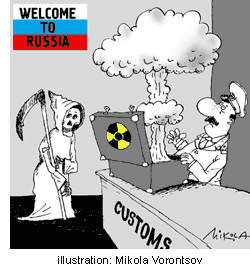|
 ST.PETERSBURG,
Russia—Russia’s most recent money-making scheme could bring 20,000
tons of nuclear waste into the country over the next two decades.
The plan, enabled by a bill recently passed by the state Duma,
the lower house of parliament, has been vigorously criticized
by economists, ecologists, and doctors. Meanwhile, even western
exporters are questioning their counterpart’s venture, saying
that the spent fuels may never reach Russia. ST.PETERSBURG,
Russia—Russia’s most recent money-making scheme could bring 20,000
tons of nuclear waste into the country over the next two decades.
The plan, enabled by a bill recently passed by the state Duma,
the lower house of parliament, has been vigorously criticized
by economists, ecologists, and doctors. Meanwhile, even western
exporters are questioning their counterpart’s venture, saying
that the spent fuels may never reach Russia.
The bill permitting the fuels to enter Russia was approved by
a vote of 243 to 125 on 6 June. Among the opposition was the democratic
Yabloko Party, whose leader Grigoriy Yavlinsky claimed that Russia
is jeopardizing the lives of its children. Aman Tuleev, governor
of the Kemerovo region, complained: “Russia is going to be the
first and the last country to pass such a bill. It is embarrassing.”
According to Javlinsky, opinion polls across the country show
Russians strongly oppose the government’s plan to use the roughly
$20 billion earned from storing the waste for developing fuel
reprocessing technologies and ecological programs. A last-minute
attempt by the Yabloko Party to bring the issue to a referendum
was defeated.
Lev Buldakov, of the State Research Institute of Biophysics,
told the NTV.ru news service on 6 June that there are no health
risks involved in working with nuclear waste, providing all the
necessary security measures are observed. Both life expectancy
and the overall health of the inhabitants of the Closed Administrative-Territorial
Formations (ZATO), areas where uranium is extracted or nuclear
arms are stored, are above average in Russia, he said on 6 June.
“Life expectancy in a ZATO area is 71 years, while it is only
65-68 across the country in general. Disease frequency in the
ZATO is low, too. This clearly shows that given the proper medical
handling, the people exposed to nuclear technologies are not in
such danger as is being claimed by some ecological activists.”
Environmental campaigners Greenpeace hopes to block Russia’s
endeavor. The Financial Times reported on 7 June that Greenpeace
is demanding that the United States--which controls over 90 percent
of the world’s nuclear waste outside Russia—block Russia’s controversial
plan. The same day, the U.S. State Department declared that if
Russia wishes to receive U.S. permission to import nuclear fuels
it must sign the treaty on peaceful nuclear cooperation. Analysts
claim that Washington fears Russia will use the fuels in military
cooperation with rogue states, such as Iran. Some states have
said they will refuse to export nuclear waste to Russia. The German
daily Die Welt on 6 June noted that the strength of the Green
Party in parliament will prevent the passage from taking place.
Meanwhile, Alexander Lebed, governor of Krasnoyarsk, the only
region capable of storing up to 3 tons of nuclear waste, was skeptical
about the Duma's decision. He told the local daily Segodnyashnyaya
Gazeta on 6 June that “The Duma’s decision is inconsistent. We
are not even provided with funds to maintain the waste we already
have. Reprocessing is going to be even more costly.”
|